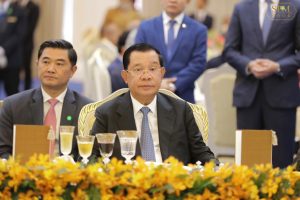Cambodia’s electoral non-event of July 2018, in which the ruling party won all the national assembly seats after it banned the main opposition party, made for a strange media spectacle.
International television stations, faithful to the notion of regular elections that are equally important and should get their allotted amount of coverage, earnestly covered the events leading up to the poll. The lack of an opposition party made it a challenge: There were no opinion polls to pore over and extrapolate, no live debates, no vox pops, no opposition leaders to interview.
On polling day, the main event was Prime Minister Hun Sen coming out of a polling station holding up his ink-stained finger to prove that he had voted. He blinked shyly into the flashing cameras as he held up his hand, like a boy at a fairground who is unsure that he has succeeded in pinning the tail on the donkey.
International political acceptance of the result in which his Cambodian People’s Party (CPP) won all 125 seats in the National Assembly assured him that he had indeed got away with it. Predictable messages of congratulation arrived from Russia and China. There were also odd tributes, disconnected from reality, from free country leaders who had won real elections themselves, but thought that the dictatorship in Cambodia deserved a pat on the back.
Hun Sen is still there now as prime minister, and it looks like there will once again be no real opposition for the national election scheduled for July. Last time around, the opposition Cambodia National Rescue Party (CNRP) was banned by the country’s politically controlled Supreme Court in November 2017. This time, it seems, Hun Sen wants to avoid the stigma of an openly one-party state in Cambodia. So rather than banning the opposition, which now exists in the form of the Candlelight Party (CLP), Hun Sen has decided that red-tape artistry is the best bet.
The result in 2018 was not, in fact, exactly what Hun Sen wanted. The ideal outcome was for a tame opposition to win a handful of parliamentary seats. This didn’t work, as no one wanted to vote for the tiny parties that were allowed to stand. Candlelight’s association with former Finance Minister Sam Rainsy, currently living in exile in France, means the party is not the right entity to achieve such a managed result.
The CLP is the same legal entity as the Sam Rainsy Party (SRP), which was created in 1998, and has the same original registration document. The SRP was a founding partner of the CNRP in 2012 with Kem Sokha’s Human Rights Party, but continued to exist in its own right and was revived after the CNRP’s dissolution.
Cambodia had local elections in June 2022 in which the CLP was allowed to run on the basis of a photocopy of the SRP’s original registration document. The original document itself was seized by the government when the police raided the CNRP headquarters in Phnom Penh after the party’s dissolution.
The National Election Committee (NEC) is now insisting on a notarized copy of the original document before Candlelight can be allowed to run. In effect the government is demanding that the opposition produce a document that the government itself has seized and may well have destroyed. Sam Rainsy says he has been told that the NEC, which is under the government’s control, is determined to create as many obstacles as necessary to stop the CLP from running.
Hun Sen has always been determined to choose his own electoral opponents. The CNRP’s official return of 44 percent of the popular vote in the 2013 election was achieved without Sam Rainsy being allowed to stand as a candidate. Appearances of democracy, at that stage, had to be maintained. The workaround was for Sam Rainsy to be given a seat to allow him to serve as opposition leader in the National Assembly anyway.
The formula did not last for long. Sam Rainsy was forced back into exile and a slew of in absentia court convictions means that he is in theory liable to decades of jail time if he returns to Cambodia. Sam Rainsy in prison in Cambodia would be a high-risk unpredictable scenario, and the very last thing Hun Sen wants. Planes have been told not to fly Sam Rainsy to the country, and Cambodia has also not made any attempt to extradite him.
Today, Hun Sen wants to stop union leader and CLP Vice President Rong Chhun from running in Kandal province, which is the prime minister’s constituency. In August 2021, Rong Chhun was sentenced to two years in prison for criticizing the government over the sensitive Vietnam border issue. He was let out after 15 months, but with a suspended sentence left hanging over him. As for other former political prisoners, this serves as a deterrent to renewed political activity, and allows the government to present him as not fully rehabilitated. A source inside Cambodia said that Rong Chhun has offered to resign from Candlelight if this would allow him to stand for election.
Letting the CLP run would create genuine uncertainty as to the election outcome. It would create a real election, or at least the need for a serious falsification of the result, and increase the pressure on Hun Sen to allow Sam Rainsy to return to Cambodia. Hun Sen has been obsessive in his need to prevent any such scenario since the mass reception in Phnom Penh for Sam Rainsy when he was allowed into Cambodia in the run-up to the elections of July 2013. So the prospect is for a rerun of the 2018 farce.
The resulting government, which is likely to be led by Hun Sen’s son Hun Manet, will stretch the international community in its ability to recognize what will be a hereditary family fiefdom, rather than a democratic government.

































